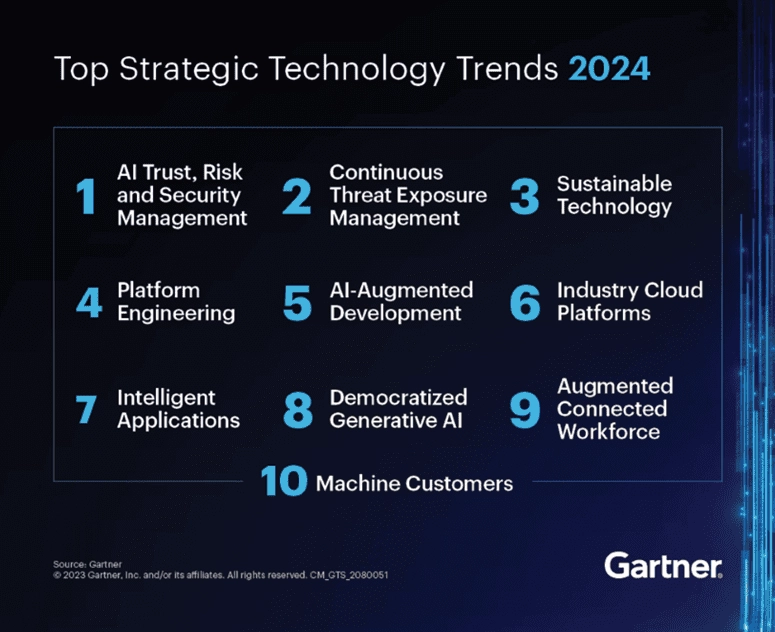EXECUTIVE
IT & business transformation
salary guide
2024
IT & business transformation
salary guide 2024
Financial Services & Industry
Author: Fergal Keys, Senior Partner
Download the 2024 salary guideView all salary guides
The Panel - Creating Exceptional Futures
The Panel is a recruitment consultancy based in Dublin, specialising in placing professionals in Executive, Accountancy & Tax, Banking & Treasury, ESG & Sustainability, Funds & Investment Management, HR & Business Support, IT & Business Transformation, and Legal.
Our specialist ethos was in our DNA from our start in 1987, when our founder Brendan Burgess established ‘The Accountant’s Panel’. The IFSC Panel was then set up to meet the growing needs of the Financial Services Centre, followed by The Legal Panel and The IT Panel.
When Anne Keys and Paul McArdle took over as Joint Managing Partners in 2010, they rebranded the business as ‘The Panel’, encompassing all the various specialisations from financial to HR, serving all sectors and sizes, from start-ups to multinationals. The company remains wholly Irish-owned and managed.
Consultants at The Panel take pride in our reputation for finding the right roles for our candidates and for matching the ideal candidates for hard-to-fill positions. Whether you are a candidate or a client, we take time to get to know you, to understand your individual requirements, objectives, and ambitions.
We’re not just a professional service, we are a personal service, developing greater futures for individuals and businesses through relationships.
Fergal Keys - Senior Partner

Fergal Keys is a Senior Partner with The Panel and heads up our specialist IT & Business Transformation recruitment practice, joining The Panel in 2006 to set up what was then called The IT Panel.
Fergal personally looks after the Executive level recruitment across the IT and Business Transformation space. He carries out numerous search and selection engagements for clients based in Ireland, UK, Europe and the US as well as FDI companies looking to establish or expand their operations in Ireland.
Prior to joining The Panel, Fergal had a successful career working at a senior level in IT and operations. Roles included working as Head of IT Europe for the leasing company GE Woodchester and subsequently as COO for Off Air Electronics (a privately held telco business). This mix of hands on practical IT experience allied with his 18+ years recruitment experience have made Fergal the recruitment partner of choice for a wide range of organisations from large international PLCs to privately held SMEs.
t: +353 (0)1 6377060
e: fergalk@thepanel.com
Connect with me on LinkedIn
www.thepanel.com
Your IT & Business Transformation Team

Ildiko Kiss, Business Operations Manager
t: 01-6377002 | e: ildiko@thepanel.com
Ildiko joined The Panel in May 2018 as a Senior IT Talent Resourcer, bringing several years of recruitment management experience with her. In 2021 she was promoted to a newly created role as The Panel’s Business Operations Manager.
In this role she manages the day-to-day operations of the business and coordinates our in-house support team covering reception, office admin and resourcing.
She is also responsible for our CRM systems and the execution of our in-house training modules. Ildiko is The Panel’s in-house Bullhorn expert.
Ildiko previously worked in the healthcare industry, specialising in the recruitment of nurses from overseas. She also worked as a freelance graphic designer and sales professional.
Ildiko graduated from IADT with a Diploma in Design Communication (2005).

Aisling Cunningham, Head of Security & Emerging Tech
t: 01-6377094 | e: aisling@thepanel.com
Aisling joined The Panel in the capacity of Head of Security & Emerging Tech in June 2024.
Aisling has over 12 years of recruitment experience behind her, both internally and externally. She has been running her own interview coaching business for the last 2 years and was previously an EMEA IT recruiter for a Big Tech company where her sole focus was on Security, DevOps, and Software Development roles.
Aisling holds multiple certificates in Employment Law, IT Fundamentals, Digital Marketing, Coaching, and Psychology.

Laura Schmitman, Senior Technical Researcher
t: 01-6377015 | e: laura@thepanel.com
Laura joined The Panel as an IT Researcher in October 2022; she was promoted to Senior Technical Researcher in November 2023. In this role she is supporting strategic searches, as a Boolean expert and data evangelist for the IT & Business Transformation team.
Having moved from Argentina to Ireland, Laura has brought several years of IT Technical recruitment and sourcing experience to this role, skills she utilises daily as a part of our very busy IT team.
Laura is a qualified Lawyer and holds various certifications in recruitment and people analytics, most notably ‘People Analytics’ from the ITBA -Technological Institute of Buenos Aires.

Ximena Ubellart, IT Researcher
t: 01-6377013 | e: ximena@thepanel.com
Ximena joined The Panel as an IT Research contractor in September 2023. She supports our IT & Business Transformation team, working closely with our Senior Partner Fergal Keys, Ildiko Kiss, and Laura Schmitman.
Ximena is an experienced Technical Talent Sourcer, with a background in HR and Legal consultancy. Proficient in LinkedIn and Boolean searching.
She has a Law Degree from the University of Buenos Aires, focused on Administrative Law and International Law, and numerous coding certifications including JavaScript, UX/UI, Web Design, Photoshop and Illustrator.
IT & Business Transformation Review 2023 and Overview 2024
Market Review 2023
The IT Executive market has been busy in 2023 with a number of key openings of senior IT Executives within the Financial Services (including Banking and Funds), Fintech, Data, Digital, and Industry sectors. Technology Leaders are driving people-centric transformation and change as companies seek ways to deploy new technology, automation, processes, and data to increase efficiencies and decision-making. This year saw companies in Ireland focused on accelerating growth amidst global economic disruption, a dynamic landscape of rapidly advancing technologies, and shifting operating models. Businesses are seeking to build more resilient and sustainable enterprise models at the same time as future proofing the core.
When it comes to the technology market, the word that probably comes to mind for 2023 would be artificial intelligence (AI). While AI /ML has dominated a lot of tech thinking this year – the Irish market was very busy with Data, Cloud, Software, CyberSecurity, Digital, PMO, and Business Change-Transformation searches.
Market Overview 2024
The Hybrid working model is here to stay – so there is a big demand for candidates with experience in Cloud Services – Infrastructure, DevOps, Site Reliability, Systems, Cloud Engineers as well as technical-desktop support specialists at all levels.
- CyberSecurity and Digital Resilience will continue to be in demand into 2024.
- Data – businesses continue to be data-driven so candidates with a background in Data Analytics/ Engineering and Science are always sought after.
- Process Improvement – Businesses are continuously looking to automate functions.
- Software – Software engineering background with expertise in Java, .Net, Python, React and Angular JS proving to be highly sought-after skillset.

Technology in Ireland 2024
From the .com bubble of the early 2000s to the present day, technology has changed and shaped the Irish organisational landscape and will keep on doing so. As we step into 2024, skilled talent remains a priority and with Ireland being the only English speaking country in the EU, Foreign Direct Investment (FDI) organisations continue to see Ireland as the best location for operations, creating a demand and shortage of top talent. This in turn forces employers to review their needs and their employee retention and attractiveness.
Place of work, back to base or not?
A recent survey found that a significant number of Irish employers plan to require their employees to spend more time in the office in 2024, while others expect to maintain existing hybrid work arrangements. The survey also revealed that a majority of employees prefer flexible working arrangements and would not accept a lower salary for a fully remote position. Meanwhile, a substantial number of employees indicated that they would be open to considering a job that did not offer hybrid working. Employer expectations for hybrid work vary, with some mandating three days of in-office presence, others requiring a minimum of two days of in-office work, and still others offering full flexibility in choosing between remote or office work. The survey’s findings suggest that employers are adapting their workplace setups in response to shifting employee preferences, and that a healthy work-life balance and in-person collaboration are still valued by many employees.
The Panel’s sentiment survey shows similar findings, and can be found further on in this guide.
Technology leaders of today
Technology leaders in 2024 are expected to do, achieve and maintain more than ever before. What are the traits for them to succeed? Here are five key skills of successful technology leaders today.
Adaptability: As the tech landscape evolves rapidly, leaders must embrace change and stay agile. Being open to new ideas, technologies, and methodologies is crucial.
Emotional Intelligence: Understanding and managing emotions—both your own and those of your team—is vital. Empathy, self-awareness, and effective communication foster strong relationships and drive success.
Tech-Savviness: Leaders need to stay informed about emerging technologies, from cloud computing to artificial intelligence. A solid grasp of tech trends enables better decision-making.
Remote Leadership Skills: With hybrid work models becoming the norm, leaders must excel in managing remote teams. Building trust, maintaining engagement, and fostering collaboration across digital channels are key.
Crisis Management: In an unpredictable world, leaders who can navigate crises—whether technological, organizational, or global—will thrive. Quick thinking, resilience, and adaptability are essential.

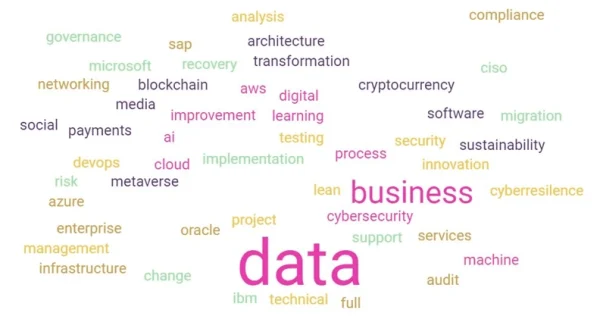
Technology Trends 2024 according to Gartner
According to Gartner there are ten key trends for 2024, that will all aid you in your quest to achieve business goals. Featuring tools and practices which will assist you in building and protecting your organisation, whilst continuing to generate overall business value.
These are:
- AI Trust, Risk and Security Management

- Continuous Threat Exposure Management
- Sustainable Technology
- Platform Engineering
- AI-Augmented Development
- Industry Cloud Platforms
- Intelligent Applications
- Democratised Generative AI
- Augmented Connected Workforce
- Machine Customers
IT & Business Transformation Salary Guide













Benefits Packages
Companies providing benefits to their employees are more likely to have higher employee retention rates, lower turnover and a strong talent available to them.
These are the key points identified by employees as valued benefits:
- Health Insurance – Tends to vary from company to company, sector to sector but includes, full/partial or membership to company healthcare scheme
- Performance related bonus and incentives for high performers
- Pension
- Education/continuous training
Employers need to be aware of how important the overall remuneration package is in order to attract and retain their staff.

Executive roles placed in IT & Business Transformation



Our Joint Managing Partners

Anne Keys
t: +353 (0)1 6377088 | e: anne@thepanel.com
Anne Keys leads The Panel’s executive search in the Funds and Investment Management sector and is uniquely placed to partner with firms hiring executives, board members and independent non-executive directors.
Anne works closely with Funds and investment firms building out or establishing a presence in Ireland and has had great success sourcing Country Heads/CEOs, Head of Function, PCF and DP roles for her clients.
Anne’s key differentiator is her extensive network developed over 25 years in recruitment and her technical knowledge of the roles she recruits for, in the funds and investment management space. She provides consultancy advice on the talent landscape, talent availability and is hugely knowledgeable on the sourcing requirements driven by the CBI.
Anne was instrumental in the set up and launch of 100 Women in Finance in Ireland and is Co-Chair of the steering committee in Dublin. She is driving 100WF workshops for senior practitioner members, advising them on how to launch their independent non-executive director career.
Anne has been invited to speak at key industry conferences in Dublin, London and Amsterdam on “CP86, Dear Chair – Getting the plan right”, “The talent landscape in the Funds & Investment Management sector in Ireland”, “ The War for Talent”, “ The benefits of an international board” and “The benefits of a diverse board”. More recently she moderated a session at Irish Funds 2022 on hybrid working. BNP Paribas’s Chief Human Resources Officer Flavie Motte was part of this panel.
The Panel is a key sponsor of basis.point – a funds industry initiative in Ireland to help make a difference to those in need.

Paul McArdle
t: +353 (0)1 6377041 | paul@thepanel.com
Paul McArdle joined the then named The Accountants Panel in October 1991, recruited by Brendan Burgess, the original founder. Paul has helped grow The Panel to becoming one of the country’s most respected professional recruitment firms.
Paul has particularly deep sectoral knowledge of the finance recruitment area and manages his own portfolio of clients, recruiting across the “C” suite in Ireland and overseas. He is seen as a trusted advisor by candidates and clients alike and is highly networked.
Paul is a columnist with The Currency, writing on all things Talent & HR related.
Our Specialist Divisions
Executive
Recruiting for executive, c-suite, and non-executive directors (iNED), is a key component of our talent search with clients working with us on both exclusive and retained basis.
Our Partners and senior team members are all well versed in finding and placing senior staff members across a wide variety of industries, both nationally and internationally.
Roles include: CEO, CTO, COO, CFO, MD, iNED, Director, Manager, Partner, and Head.
Consultants: Anne Keys, Paul McArdle, Alan Bluett, Sarah Kelly and Fergal Keys.
Accountancy & Tax
The Accountants Panel focusses on accounting, finance, and tax jobs in Ireland at all levels of an organisation.
Roles include: CFOs, Finance Directors, Group Financial Controller, Financial Services—Internal Audit, Financial Reporting, Financial Analyst, NQ Accountants, NQ Financial Accountants, Management Accountants, Tax Accountants and accounts staff, such as Payroll, Accounts Payable, Accounts Receivable, Credit Control and general accounts staff.
Consultants: Paul McArdle, Andrew Ganly, Andrew Wynne, Andrew Adamson, and Olivia Wallace.
Banking & Treasury
Our Banking and Treasury division caters for roles within banking, corporate treasury, commercial treasury and insurance with some of Ireland’s leading organisations.
Roles include: Corporate Treasurer, Treasurer, Treasury Analyst, Risk, Compliance, Quant, Stockbroking, Asset Management, Trading, Front Office, Middle Office, Back Office, Data, Settlement, Financial Advisor, Wealth Manager, Retail Banking, and Investment Banking.
Consultants: Alan Bluett, Darina Heavey.
Resourcing: Farah Daoub
ESG & Sustainability ** NEW DIVISION**
This is one of our newest additions to The Panel’s offering when it comes to top talent. Led by our colleague Darina Heavey, we have a dedicated desk within this exponential part of the job market. Our colleague is not only highly networked on the scene but highly knowledgeable when it comes to the rising requirement for organisations to fill roles of this nature.
Roles include: Directors, Associate Directors, Consultants, Managers, Officers, and Executives.
Sustainability—Head, Advisor, Consultant, Director, Coordinator, Manager, Officer.
ESG—Manager, Consultant, Project Manager, Analyst, Legal Counsel, Advisor, Auditor, Analytics, Climate Action.
Consultant: Darina Heavey
Funds & Investment Management
The Accountants Panel focuses on accounting, finance and tax jobs in Ireland at all levels of an organisation.
Roles include: Executive, Leadership ManCo, PCF-1/8/11//12/14/39A—F/42, Fund Administration, Investment, Compliance, Risk, Analyst, AML, Data, Fund Accounting, Transfer Agency, Depositary, Middle Office, Custody, Client Relationship Management, and Financial Reporting.
Consultants: Anne Keys and Liam Murphy
Resourcing: Farah Daoub
HR & Business Support
Offering top talent in all areas of HR and business support to organisations in Financial Services and Industry.
Roles include: HR Director, HR Partner, HR Manager, HR Generalist, HR Business Partner, Head of HR, HR Resourcer, HR Administrator. Administrator, Office Administrator, Office Manager, Office Coordinator, Recruiter, Executive, Personal Assistant and Company Secretarial.
Consultant: Ailbhe Mullen
Legal & Company Secretarial
The Legal Practice at The Panel is one of Ireland’s longest-established specialist Legal recruiters. Our consultants are highly networked and extremely knowledgeable, offering candidates & clients extensive insight into the Legal recruitment market.
Clients include top and mid-tier (domestic and international) law firms, multinational companies, large indigenous organisations as well as SMEs in sectors including: ESG, asset management, banking, insurance, technology, fintech, telecoms, energy, retail, aviation, pharmaceutical & professional services.
Roles include: Commercial Lawyers, Legal Directors, Senior Legal Counsel, Employment Lawyers, Construction Lawyers, Company Secretary.
Consultants: Sarah Kelly
Candidate Sentiment Survey
The Panel runs a Candidate Sentiment Survey to assess candidates’ attitudes to certain topics.
- 2158 candidates completed the survey.
- The candidates surveyed were from junior management to “C” suite level across the IT, finance, accounting, legal, HR,and ESG professions.
- The candidates were presented with a multiple-choice answer for every question, bar question one, where they chose every answer applicable to them.
- Where the same question was asked in our Autumn 2022 survey, we provide a comparison to Autumn 2023.
- The survey had a “free text” box at the end, and over 10% of the candidates chose to give us their observations on certain topics.
- Their observations are under the relevant questions in italics, and we have purposely given them a voice; this is their survey.

Post-pandemic, now that things are settling back to normal, I…
(Respondents clicked all that where appropriate) 2,106 out of 2,158 people answered this question.
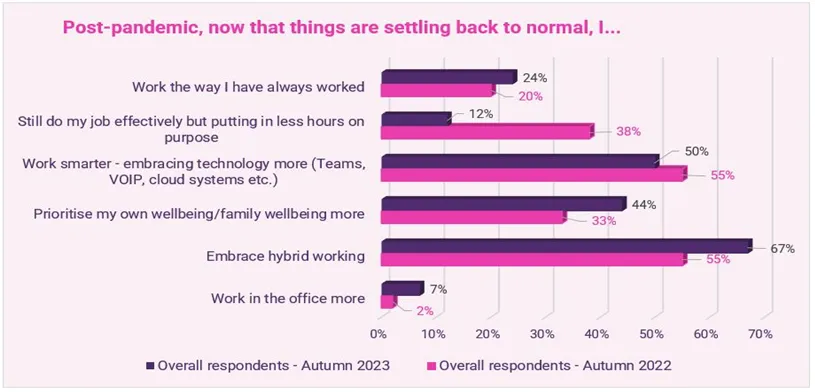
Comparing the responses to the same questions from Autumn 2022, more people are working the way they always worked and are back doing more hours.
As the hybrid market is maturing, we see a 20%jump in those embracing hybrid working (67% from 55%). In tandem, over three times as many people are working in the office (7% from 2%), albeit coming from a low base. Many respondents who do hybrid seem to be spending more time in the office than before while still WFH.
Interestingly, a third more (44% from 33%) are prioritising their family and wellbeing; respondents seem to be more aware of wellbeing, a legacy of COVID living it seems.
From the respondents’ comments below this question and others, you will see a variety of reasons for this.
“I think people like me who did the rat race for 20 years prior to COVID-19 will not return to 5 working days in the office.”

Which of these statements best reflects where you would like your place of work to be today?
2,094 out of 2,158 people answered this question.
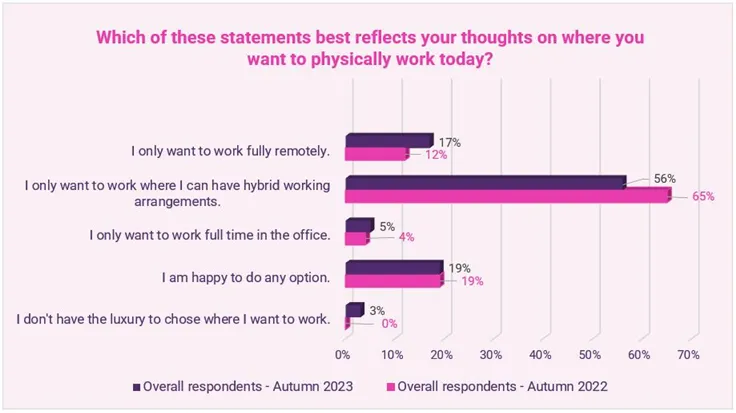
This question concentrates on where the respondents themselves want to work if it was their choice. Many of the answers to these questions remained consistent from the previous year (the last question was not asked in 2022). There is a significant upsurge of 40% (17% from 12%) who only want to work fully remotely.
Conversely,the number of people who would elect to work in a hybrid fashion has fallen from 65% to 56%, while working full-time in the office saw a 25% jump, albeit again from a low base, 4% to 5%. This suggests that the desire of respondents to move from hybrid to remote is something we need to keep an eye on.


“Businesses must give the option to full remote work from ANYWHERE not just the country they mainly reside. The mentality must change.”
“My thoughts on WFH are that it should be driven by the function that is performing the work; some functions lend themselves more easily to a hybrid balance than others. It is also very important for junior talent to feel the culture/environment of a company, as this is not something that can be experienced online over a sustained period. If companies are looking for tenure from their employees, then this is something that comes with time and relationships with their team and the management of an organisation.”
“I used to travel 2.5 hours each way for many years. I was always tired and had no time for myself or my family. Well before COVID, I had an arrangement to work from home some days. Then after the beast from the east, I worked from home all the time and only went to the office maybe once a month… my management at the time was so happy with this as my work was done as well as before, and I am also able to help others out when they need me.”
My employer...
2,044 out of 2,158 people answered this question.
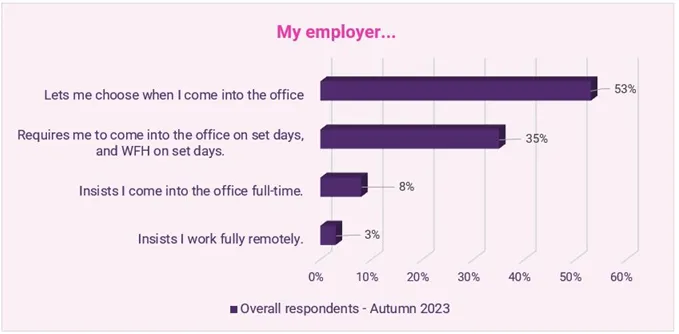
Over half the respondents are allowed to choose when they can work in the office, with a third of employers mandating set days to be in the office. Less than 10% of employers insist that people return to the office full-time; anecdotally, we hear this trend is rising. Other businesses operate fully remotely, albeit at a low figure of 3%.
“An employee starting out in their career probably feels the need to engage more face-to-face in an office environment, whereas a working parent finds the challenges of a commute more stressful. Balance is key, and finding the balance that works for you is important. Employers should embrace people who are different with varying demands on their time.”
“Personally, it’s about flexible hours in the office instead of home/office hours. My view.”
“Employers trying to increase engagement and presenteeism feel like a desperate ploy to tie employees to the work and save the value of their buildings.”
“I am 50. Mostly remote works for me, but I think it must be very difficult for younger employees starting out. So much is learned in an office environment by osmosis! Older workers need to remember that they were mentored and helped, and they need to do the same for this generation of young workers.”

“Some employers seem to be squeezing employees for a return to the office. However, work flexibility is key right now, especially for those with children and then to be the more experienced staff members and harder to replace.”
 “In the last 4 years, I have worked nearly exclusively at home, in an organisation with nearly 6,000 employees.”
“In the last 4 years, I have worked nearly exclusively at home, in an organisation with nearly 6,000 employees.”
“Despite efforts to the contrary, I think working from home, either exclusively or through hybrid working arrangements, is here to stay.”
“Working from home must be measured. Young employees may have difficulty putting in 8 hours working at home. Employers must be responsible.”
“Employers need to be more flexible with hybrid working to attract & retain talent. Also, salaries need to be reviewed with rising costs.”
“I generally work with and manage what would be considered a “younger generation” of employees. I feel there would be a broader divide between my opinions on the questions in this survey (I’m in my mid-50s now) to, say, the 25-35 age bracket of office-based professionals.”
“I think there is a strong generational/age aspect to the want to be in the office or not, but it may end up being a different career trajectory for them; only time will tell.”
“Working from home shows a company is flexible.”
“IT workers have no reason to be in the office.”
“Managers feel very threatened by the Hybrid environment.”
“I think people need to work in the office at least 2 – 3 days per week. So much is learnt at the “Water-cooler” and having coffee/lunch with people. It also helps individuals grow in an organisation. For me personally, I am happy with Hybrid, although if I take on a new job in a new organisation, I think it would be more beneficial, at least in the short term, to spend as much time in the actual office as possible, provided others are there also.”

If you do hybrid working, how many days does your employer require you to come into the office?
(Respondents who answered the previous question with the answer hybrid, then answered this supplementary question, hence no 5 days (full time) in the office option). 717 out of 2,158 people answered this question.
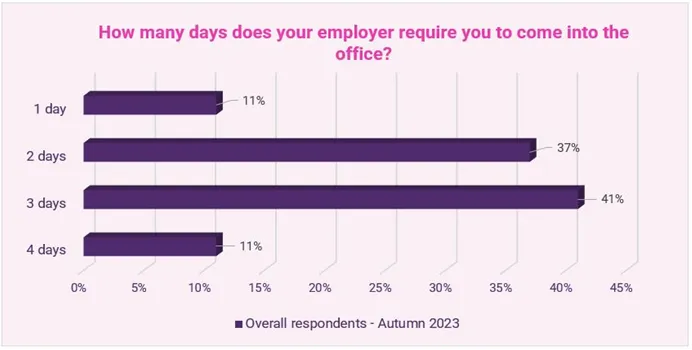
There are no real surprises here; most of our clients offering hybrid work options have their teams in two or three days in the office. That over one in ten employers are looking at four days on-site is a trend to keep an eye on, especially when you add it to the 8% in the office full-time, so one in five employees are back working in the office a minimum of four days a week.
“Personally, I like going into the office a few days a week (I love the flexibility of 1-2 days WFH), but I think a lot of companies are slowly shifting away from hybrid models.”
“I work in the office 4 days; we are required to do 3, but with people choosing their WFH days, it’s hard to get people together for meetings, and even if in the office, it’s still Zoom meetings. I would prefer in-person meetings as they are more productive. On Zoom, people are distracted and are doing other things.”
“I try to focus more on the outcome/productivity of my team and not focus on the where so much.”
“Mandatory 3 days in office with 1 anchor day but I pick and choose the 2 days to juggle family commitments. I have a short commute in Limerick with plenty of parking so the RTO not really impacting me.”
“My sense is the balance shall revert to employers in the next six months. This may result in more employers requesting employees to be on site full-time. Employers may be underestimating how this might impact their ability to retain and hire.”

At the moment my physical working arrangements are…
2,043 out of 2,158 people answered this question.
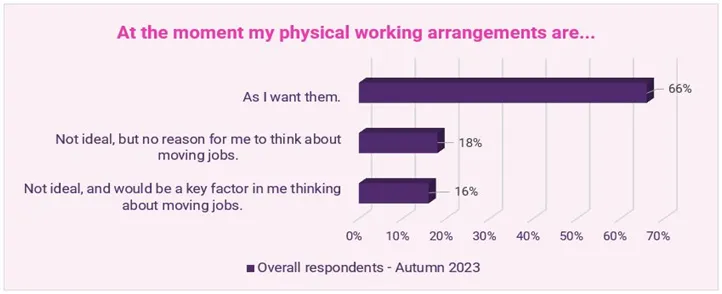
That one in every six respondents are looking at their physical workspace as a reason to go on the jobs market is something employers need to be cognisant of. Particularly relevant if employers are mandating a return to the office.
“My preference for WFH is driven by being able to afford to buy what I want in Dublin, so I will be moving to Wicklow/ Wexford. I will still go to the office as needed.”
 “I believe that work-life balance is crucial for organisations success however, somehow, most older managers don’t want to accept it.”
“I believe that work-life balance is crucial for organisations success however, somehow, most older managers don’t want to accept it.”
“Employees want to work in a meaningful manner. To get the best out of them they need to be treated like adults. Autonomy, responsibility, and trust are key. If I don’t get those I move on.”
“The balance re workload has shifted, hybrid working has led to an out of sight out of mind attitude. Those in the office do more and are asked to do more.”
“Always be open to hearing feedback from your employees, and if mandating people back to the office for collaboration, ensure senior management applies to that also. I was remotely managed and had to bring all my teams back, and not once physically met my own direct management team.”
“In my view, the option to WFH is essential and would be one of the top three considerations if I was changing employment. Currently, my employer allows 2 days per week, but I would prefer 3.”

I feel the balance of power in the present job market is…
2,041 out of 2,158 people answered this question.
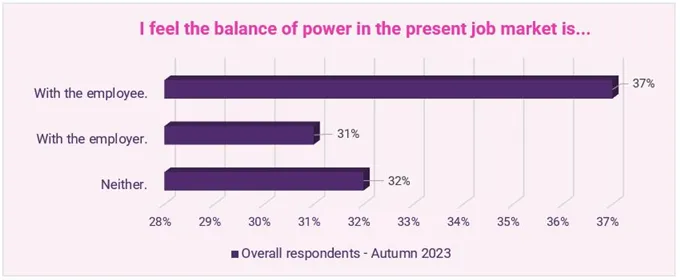
Most respondents feel that the balance of power is still with themselves, the employee. That less than a third think the balance of power is with the employer is noteworthy. Anecdotally, we believe this number will rise as the jobs market begins to soften.
“There is definitely a change of circumstances when speaking with friends and their working arrangements post-pandemic…”
“My company were one of the first back in office and it’s strictly 3 days which is not ideal. It almost feels like being treated like children.”
“Working remotely or in a hybrid situation is fine if the employer trusts his employees. When that trust breaks down and the employee is tracked through his computer program as to how long he is working then that trust level has gone and is detrimental to the company and overall business…”
 “Companies need to establish online training for all employees on how to manage communication remotely, discipline on meetings online, effectiveness and reporting that is necessary. Rebuttals regarding forcing employees to be in the office needs to consider the travel, sustainability, and efficiencies of forcing employees to work in the office. If the role is desk based, it’s hard to understand the sustainable and operational costs benefit of maintaining an office which is hardly populated when hybrid or remote working is in place. Additionally, the property challenges companies need to consider holding valuable office space in cities when employees need accommodation, particularly when a company operates a hybrid/remote working model, that giving up the property to residential use is a real need in cities to re-populate the centres and cultural needs.”
“Companies need to establish online training for all employees on how to manage communication remotely, discipline on meetings online, effectiveness and reporting that is necessary. Rebuttals regarding forcing employees to be in the office needs to consider the travel, sustainability, and efficiencies of forcing employees to work in the office. If the role is desk based, it’s hard to understand the sustainable and operational costs benefit of maintaining an office which is hardly populated when hybrid or remote working is in place. Additionally, the property challenges companies need to consider holding valuable office space in cities when employees need accommodation, particularly when a company operates a hybrid/remote working model, that giving up the property to residential use is a real need in cities to re-populate the centres and cultural needs.”
 “My current employer is firing people for not being in the office enough. They are very inflexible. A death in the family was not a good enough excuse for not making office day target. People are leaving because of their hard-line, which I believe is what they want.”
“My current employer is firing people for not being in the office enough. They are very inflexible. A death in the family was not a good enough excuse for not making office day target. People are leaving because of their hard-line, which I believe is what they want.”
“I really think 2/3 day hybrid model is the best of both worlds, it allows you to connect to colleagues but also gives downtime to work on reports and do small things like accept couriers. I think a more even balance of power is what’s needed. The best workplace is where there is open communication and collaboration between employers and employees. Both sides need to feel listened to and their point of view understood, and this is an ideal opportunity for the good employers to rise above and make themselves known and attractive to the best candidates.”
“Pressure on employees has increased in 2023. Companies dictating number of days in the office has caused a lot of dissatisfaction amongst employees.”
“Career challenges are about companies cutting cost in favour of shareholders return. There is work, there is justification for positions, however there is limited budget.”
“Some employers seem to be squeezing employees for a return to the office. However, work flexibility is key right now especially for those with children and then to be the more experienced staff members and harder to replace.”
“There’s an imbalance in how the same employer treats different employees regarding remote working.”
“Salaries must increase. Retention will become an issue otherwise.”

I think the next 12 months…
2,029 out of 2,158 people answered this question.
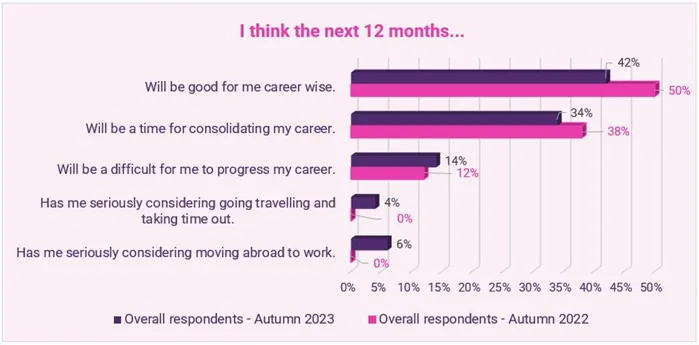
Overall, candidates are more downbeat on their career prospects compared to 12 months ago. Less than half of them think that the next 12 months will be good for them career-wise, a fall of 16% (50% to 42%). Over one in ten is worried about their career progression, while the 10% thinking of taking time out or travelling/working abroad is a higher number than we expected.
Please note that we did not ask the last two questions in our Autumn 2022 survey, so no comparison figures are available.
“Not sure what consolidating my career meant exactly, but I took it as considering opportunities/options!”
“Compensation gap between newly qualified and experienced needs to grow.”

“Increasingly I am finding that age as opposed to work preferences or competence are becoming an issue.”
“Hiring process is unnecessarily complex and overly demanding. Good candidates are being overlooked or end up burnt out by the multiple interviews, presentations and assignments. The expat community are returning and while they may be considered as not having Irish experience or even worse “being overqualified”, they bring valuable skills and an international and growth perspective but are dismissed because of aforementioned reasons. Overqualified is the last true discrimination used by employers and it is pathetic.”
From my own career perspective, the next 12 months have me in…
2,045 out of 2,158 people answered this question.
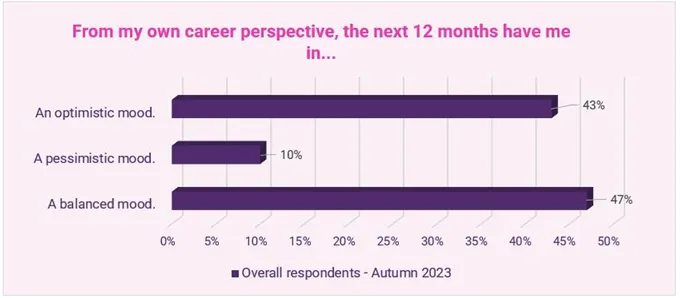
Overall, the mood music is good, with only one in ten of the respondents in a pessimistic mood. This is a good barometer to follow. It will be interesting to see how the trend unfolds in future surveys.
“I have stopped working since May 2022, and home working enforced by the pandemic response was the catalyst for me. On balance, it’s more destructive than helpful, in my experience, and I have spoken to many people whose experience was the same.”
“Business environment for certain sectors will be very tough over the next 12 -18 months.”

How would you describe the importance of a positive workplace?
2,031 out of 2,158 people answered this question.
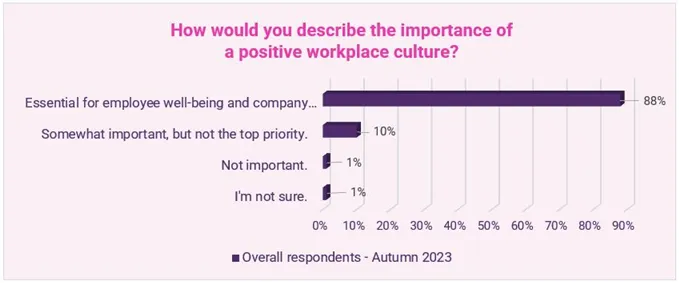
That nine out of every ten respondents put a high value on workplace culture is something all employers need to note. The respondents clearly link workplace culture to the success or failure of a business. There is huge “buy-in” from candidates, and companies who foster a positive work environment and culture will retain/attract talent more easily.
 “I feel things are still a little polarised. On the one side you have companies who see in-person being critical to culture and performance and on the other end of the spectrum, a portion of employees seeing flexibility as their main priority.”
“I feel things are still a little polarised. On the one side you have companies who see in-person being critical to culture and performance and on the other end of the spectrum, a portion of employees seeing flexibility as their main priority.”
“Pre-pandemic cultures are creeping back in. Perhaps worse – an expectation to be always on and always available. No consideration for working parents and the difficulties on childcare, cost of living, housing. Insistence on working in office, when it’s not an efficient use of time, is not motivating or helpful.”
“Enforcing a 3-day RTO policy is out of touch, especially considering the impact of inflation on commuting expenses. It’s unfair to mandate RTO for everyone when not all employees need it. If the issue is related to company culture, then it’s more appropriate to allocate budgets for team building and other EVP initiatives. RTO is not the solution to a culture problem, as it’s often deeply rooted.”
“There should be frequent social events in case of hybrid working. Further, there should be designated days for teams so that teams can connect in person.”
Has a negative workplace culture ever been the main reason you have left a job?
2,024 out of 2,158 people answered this question.
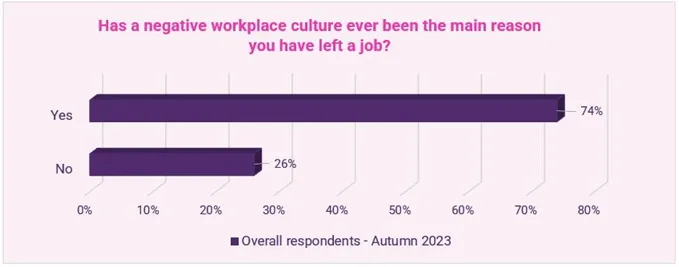
We believe in the saying, “You don’t leave your job; you leave your Manager”. A lot of negative workplace cultures are the fault of the leaders within the business; sometimes, it can be just one overpowering presence. That said, three out of four respondents left a role because of a negative culture, which is much higher than we envisaged.
“Employers continue to pay lip service to culture, inclusion, diversity etc. Not so much from an LGBQ perspective but more from an appreciation of opinion, background, experience etc. Will definitely be leaving my current role due to the above.”
“Being connected is not really a function of remote vs in office. It’s about management and culture of the staff. Bad management is just amplified a bit by being remote.”
“The sense of belonging can be difficult to achieve in fully remote working. It takes more effort to instil culture, but it is crucial for success.”
“While the hybrid working model has offered great options in workplace norms, management must be careful that negative organisation behaviours become established do the detriment of culture, equality and inclusion.”
“In general companies need to accept the new norms and understand that culture can still be proactively driven in a positive way. Connectivity is important but needs to be a priority and front and centre with the leadership team.”
“The most important asset within an organisation is its people!”
“Culture of a business is based off our interactions. Productivity is now viewed on time in the office together.”

If you work in an office less than 2 days per week, do you find it more difficult to connect with the culture of your organisation?
1,904 out of 2,158 people answered this question.
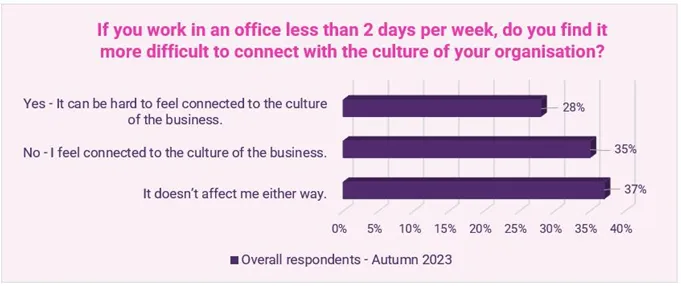
One of the questions we were keen to ask was about company culture and the possible disconnect that people may feel from being in the office for two days or less. Interestingly, over one in four respondents feel disconnected; we were expecting this figure to be higher. This question was one that generated a large organic response, with some interesting observations from the respondents below.
“Difficult to get colleagues back to the office, a definite drop in connection.”
“Workplace cultures can be very complex these days, often obscured by political correctness and a tendency for certain behaviours and prejudices to be hidden from plain sight. Genuine openness and transparency are thus increasingly rare.”
“I feel working fully remotely is not beneficial. In terms of building relationships with colleagues, some in-office time is important. A minimum of one day a week.”
“Culture is a word thrown around but rarely defined by companies. Most use it as a generic term to force an agenda or change, returning to an office for no reason, as an example. It’s usually set by people at a level who are quite disconnected from the general workforce, so they don’t actually know what they are talking about. I’m a big fan of promoting and embracing culture, it’s just done terribly, and no amount of pizza & beer in a dreary IFSC building will change that.”
“Likely that many firms will continue to ask employees to go back to the office, not just for culture but also so that graduates can learn from experienced employees.”

“Ensuring a good work culture while using hybrid working lies mainly with the employer.”
“I feel connected to the culture remotely because I’m with the organisation for a long time, which may not be the case if I’d just started or was with the organisation for a short period.”
“The issue of hybrid working and how that is most effectively deployed in organisations is yet to reach a full conclusion. While remote working is valued by employees in being more time efficient and effective in use of time, the necessity of in-person attendance is increasingly becoming recognised. In-person attendance is essential to fostering workplace culture, brand loyalty and safeguarding the long-term wellbeing of employees by providing social and networking opportunities for support and to avoid burnout.”
“While I feel connected to the culture of the company, I understand that a remote set-up makes it harder to bring people into the team and the culture.”
“I believe if hybrid working is to work well, they’re needs to me effort on the part of the employee to connect with corporate culture. It’s not going to happen as organically as when you are full time in the office.”
“In my current role I manage teams in the US & EMEA. Technology is a priority for me in ensuring a unilateral management approach across both regions. That being said, my experiences & driving developmental factors are coming from the US which don’t serve me in applying for new roles outside of my current company, but I struggle a bit with the personal relatability with my US teams as I can’t meet them in the office.”
“As a contractor, I have mostly noticed HR and People Teams have become disconnected from their workforce. Lunches, merch, etc are not what people look for. Vision, roadmaps, product strategies, etc. is what makes them excited.”
We would like to thank all the respondents for filling out the survey.
Special thanks to those who chose to add comments; these were particularly illuminating.

The Panel - DE&I and Sustainability
Sustainability
 As time moves on the sustainable responsibility of employers are becoming more and more important, therefore we here at The Panel take great pride in doing our best in meeting our target in this area. We take responsibility for our candidates, clients, and every part of our business in order to offer and supply solutions that positively impact those around us.
As time moves on the sustainable responsibility of employers are becoming more and more important, therefore we here at The Panel take great pride in doing our best in meeting our target in this area. We take responsibility for our candidates, clients, and every part of our business in order to offer and supply solutions that positively impact those around us.
Knowing that you are partnering with a responsible organisation, should offer you peace of mind.
Read more on our Sustainability Policy here.
Diversity, Equality & Inclusion (DE&I)
In The Panel we actively focus on sourcing talent through a DE&I lens – we know diverse teams make for better functioning and more collaborative teams.
The Panel and our Managing Partner Anne Keys were instrumental in the setup and launch of 100 Women in Finance in Ireland in 2017, she acted as Co-Chair for 100 Women In Finance Dublin location for one year, and is currently driving 100WF workshops for senior practitioner members, advising them on how to launch their independent non-executive director career.
In November 2017, The Panel signed up to the Ibec/30% Club’s “Voluntary Code of Conduct for Recruitment and Executive Search Firms Code”.
This Code recognises the importance of search firms and client organisations working together to deliver change based on four principles:
- Strategy & Goals
- Talent Pipeline
- Prices
- Monitoring & Reporting
 What can The Panel help you with?
What can The Panel help you with?
Regulations– guiding candidates and clients through the Irish regulatory environment.
Market analysis– updating candidates and clients on current trends.
Talent acquisition– for clients we help source the best candidates for the role at hand.
Advice– we provide our candidates and clients with the most up-to-date information available regarding the market, the recruitment processes and the best remunerative options available to both.
Technology & Resources – offering candidates and clients the most up to date in recruitment and AI technology, enabling a quicker and more efficient recruitment process from start to finish.
As a company The Panel has successfully strived for internal diversity and inclusivity and in doing so we firmly believe that puts us in a strong position to be ambassadors for our clients in an Ireland that is becoming ever more progressive, diverse and inclusive.
- We support groups for women in business e.g. 100 Women in Finance& Women Executives.
- We employ 8 different nationalities with various cultural and religious beliefs.
- We have a higher proportion of female employees.
- We have two joint MD’s at the Panel,1 male and 1 female.
We believe we are one of the most diverse and inclusive recruitment companies in Ireland, putting us in a position to help our clients achieve the same.
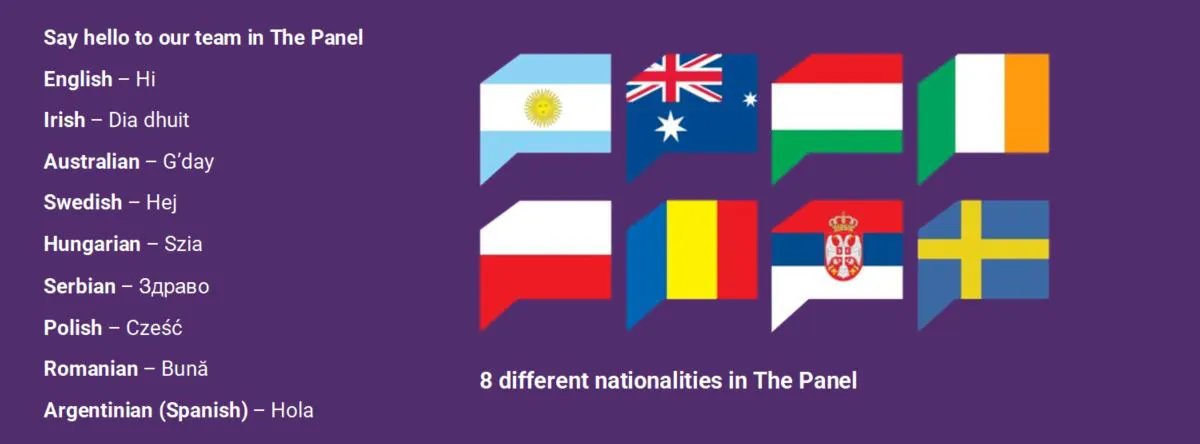
We instill the following approach through rigorous training of our employees;
- Equal Employment Opportunity is a fundamental right of all employees and applicants for employment.
- The Panel undertakes not to discriminate unfairly against any applicant in respect of the subject matter of disclosures made pursuant to the pre-engagement screening process or any other information revealed during the engagement process.
- All applicants are provided a full and fair opportunity for employment, without regard to race, colour, religion, national origin, disability, gender,age,sexual orientation, genetic information, or parental status
- We promote equality for all candidates.
- We foster and support a globally diverse and inclusive workforce with our clients and place a high value on diversity and equal opportunity.
- We believe it is important for applicants to be considered for the employment of their choice and have the chance to perform to their maximum potential.
- The Panel is an equal opportunity Employer and Recruiter.
